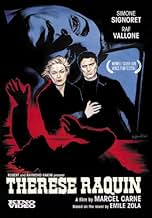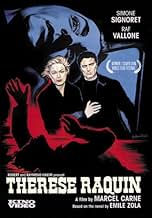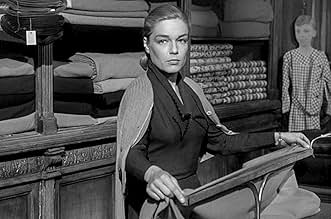IMDb-BEWERTUNG
7,4/10
2041
IHRE BEWERTUNG
Ein LKW-Fahrer tötet den Ehemann der Frau, die er liebt, und wird zum Objekt einer Erpressung.Ein LKW-Fahrer tötet den Ehemann der Frau, die er liebt, und wird zum Objekt einer Erpressung.Ein LKW-Fahrer tötet den Ehemann der Frau, die er liebt, und wird zum Objekt einer Erpressung.
- Auszeichnungen
- 2 Gewinne & 2 Nominierungen insgesamt
Martial Rèbe
- Grivet
- (as Martial Rebe)
Francette Vernillat
- Françoise, la bossue
- (as Françoise Vernillat)
Madeleine Barbulée
- Madame Noblet, une cliente
- (as Madeleine Barbulé)
Empfohlene Bewertungen
Therese Raquin (1953)
You may be familiar with the lead actress, Simone Signoret, from Les Diaboliques, made a year after this film, and she plays a similar conflicted or complex, strong type of woman in a sordid world. She plays the title character, based on a Zola story, who is swept into a romance she doesn't completely expect and then a murder that she doesn't completely abhor.
And she is rather brilliant, a slightly different type than American actresses of the time, but commanding in her stoic intelligence. The two men are both first rate, one a foreign (Italian) charmer and the other a sharper fellow who is only slightly over his head. In fact, everyone is just slightly extended into decisions they don't quite know how to make. The fact that things go wrong is just part of great drama, and part of life, too.
The filming (photography and editing) is totally gorgeous here, The plot progresses slowly enough it might seem to drag, but I think it works in the long run, setting a deliberate and inevitable pace to events. What is maybe weakest is the ending, where things get a little spectacular, perhaps in a fascinating way, but certainly no longer believable.
Director Marcel Carne is no household name in this country, but the strength of this film alone makes me want to find others and get a feel for his style. Recommended for those who like drama, melodrama, and a sort of Euro-noir style, and who don't mind reading subtitles.
You may be familiar with the lead actress, Simone Signoret, from Les Diaboliques, made a year after this film, and she plays a similar conflicted or complex, strong type of woman in a sordid world. She plays the title character, based on a Zola story, who is swept into a romance she doesn't completely expect and then a murder that she doesn't completely abhor.
And she is rather brilliant, a slightly different type than American actresses of the time, but commanding in her stoic intelligence. The two men are both first rate, one a foreign (Italian) charmer and the other a sharper fellow who is only slightly over his head. In fact, everyone is just slightly extended into decisions they don't quite know how to make. The fact that things go wrong is just part of great drama, and part of life, too.
The filming (photography and editing) is totally gorgeous here, The plot progresses slowly enough it might seem to drag, but I think it works in the long run, setting a deliberate and inevitable pace to events. What is maybe weakest is the ending, where things get a little spectacular, perhaps in a fascinating way, but certainly no longer believable.
Director Marcel Carne is no household name in this country, but the strength of this film alone makes me want to find others and get a feel for his style. Recommended for those who like drama, melodrama, and a sort of Euro-noir style, and who don't mind reading subtitles.
A riveting modernization of the eponymous Emile Zola novel, THÉRÈSE RAQUIN chronicles the adulterous infatuation between a burly truck-driver and the beautiful, badgered wife of his feeble colleague that results in murder, blackmail and psychological-damnation. Marcel Carné deftly taps into the mechanics of American film-noir of the 1940s with conspicuous blending of plots of two celebrated James M. Cain classics: "DOUBLE INDEMNITY" & "THE POSTMAN ALWAYS RINGS TWICE" and skilfully harmonizes it with the drab and monotonous lifestyle of the French bourgeoisie. There are subtle nods to Hitchcock's "BLACKMAIL" and uncanny parallels with Park Chan-Wook's "THIRST" (which in retrospect make perfect sense as Park also borrowed significantly from the Zola novel.)
Simone Signoret is phenomenal as the titular lead and her transformation from a browbeaten wife trapped in a loveless marriage to a sympathetic femme-fatale is adroitly handled. Her restrained turn might seem too stoic at first but she exudes volumes through her apathetic veneer. Raf Vallone (reminiscent of a brooding Burt Lancaster) is convincing as the impulsive truck driver who's determined on unshackling Thérèse from her oppressive, wretched existence. Roland Lesaffre's addition as the greasy, opportunistic sailor further strengthens the elements of suspense in the story. The naturalistic B+W photography is excellent and maintains a healthy balance between carefully choreographed claustrophobic scenarios and exquisite exterior compositions.
Thérèse Raquin represents French film-making of the old school where storytelling was paramount and is recommended to connoisseurs of classic film-noir
Simone Signoret is phenomenal as the titular lead and her transformation from a browbeaten wife trapped in a loveless marriage to a sympathetic femme-fatale is adroitly handled. Her restrained turn might seem too stoic at first but she exudes volumes through her apathetic veneer. Raf Vallone (reminiscent of a brooding Burt Lancaster) is convincing as the impulsive truck driver who's determined on unshackling Thérèse from her oppressive, wretched existence. Roland Lesaffre's addition as the greasy, opportunistic sailor further strengthens the elements of suspense in the story. The naturalistic B+W photography is excellent and maintains a healthy balance between carefully choreographed claustrophobic scenarios and exquisite exterior compositions.
Thérèse Raquin represents French film-making of the old school where storytelling was paramount and is recommended to connoisseurs of classic film-noir
Despite the considerable talent involved, this tale of passion and murder is pallid stuff. It's filled with bald plot-twists, ending with the ultimate of deux ex machinas, a huge truck careening down a small street for no reason except to kill off a major character, thus creating the pat ironic ending. Every plot twist is unconvincing, from the idea that Vallone and Duby would hit it off in any context, or that the couple would plan to leave a day or so after they told her husband about their affair rather than immediately, to the mother conveniently having a totally paralysing stroke at just the right moment. I guess one can blame Zola for some of this, but this updated version adds nothing.
I'll have to disagree with some of the more negative comments about this film. Marcel Carne has succeeded beautifully in capturing the mood and major themes of Zola's novel in THERESE RAQUIN. It's nice to see a film from the period dealing with common working class people caught up in the turmoil of love and everyday life. The main romantic leads initially seem a little mismatched but by film's end the ice has more than melted between them. How many times have we seen the female lead fall too quickly for her suitor. Here it takes its sweet time and plays the better for it. Signoret's titular character seems almost a bit too stoic but considering her numbingly bland and lenghty marital situation, it may well be authentic. As many women are in reality, Therese is fiercely loyal to her husband, whether he deserves it or not. The ruggedly handsome Raf Vallone is ideally cast as the trucker who steals her attention and makes a good contrast to her dishrag of a husband. A blackmailing sailor who appears in the middle of the film before making a menacing reappearance near the end is very effectively played by Rolland leSaffre. He is as creepy as Robert Mitchum in CAPE FEAR. Do seek this one out and enjoy the ride!
Emile Zola wrote page turners. He focused on the injustices of the great unwashed of France, from miners to prostitutes. His books were incredibly naturalistic and moralistic. His characters seldom came through unscathed but made a statement about the cultural milieu of the time. This is a story about passion. Therese Raquin is the wife of a tiresome mama's boy hypochondriac. She is beautiful and is married to this childish wimp. Along comes the handsome truck driver after she has spent six empty years with this guy. They have tryst and even let the husband know that he is going to lose his wife. Everything changes when, on a train trip to Paris, fate takes over. Granted, there are lots of plot contrivances, but that's the literary style of the period. Also, in the naturalist tradition, the characters often lose control of their destinies. There is a broader moral sense that trumps the likable ending that people are used to in movies made at this time. The writer and the director can't turn their backs on issues like these and so life goes on and the impulsive and evil are punished alike.
Wusstest du schon
- WissenswertesRaf Vallone refused to be dubbed in the French version and had his contract amended accordingly. The scenario was also slightly changed to "Italianize" the character of Laurent.
- VerbindungenFeatured in Mémoires pour Simone (1986)
Top-Auswahl
Melde dich zum Bewerten an und greife auf die Watchlist für personalisierte Empfehlungen zu.
- How long is The Adultress?Powered by Alexa
Details
- Erscheinungsdatum
- Herkunftsländer
- Sprache
- Auch bekannt als
- The Adultress
- Drehorte
- Produktionsfirmen
- Weitere beteiligte Unternehmen bei IMDbPro anzeigen
- Laufzeit
- 1 Std. 42 Min.(102 min)
- Farbe
- Seitenverhältnis
- 1.37 : 1
Zu dieser Seite beitragen
Bearbeitung vorschlagen oder fehlenden Inhalt hinzufügen















